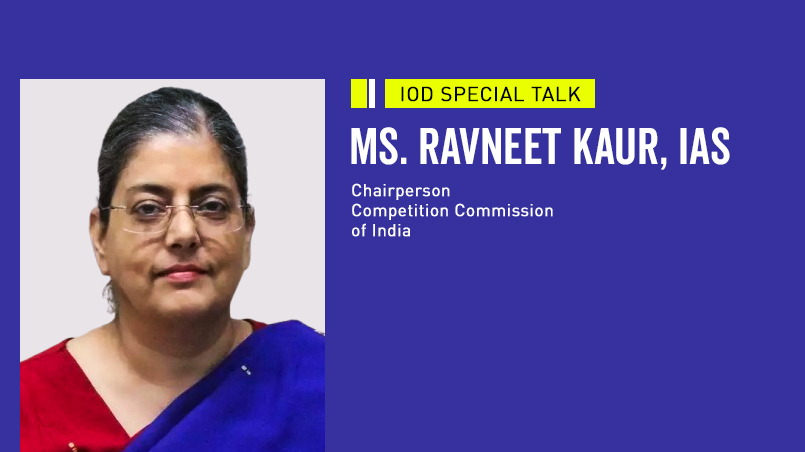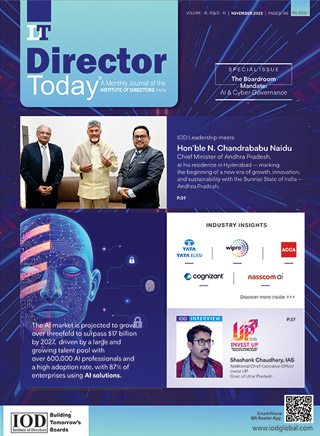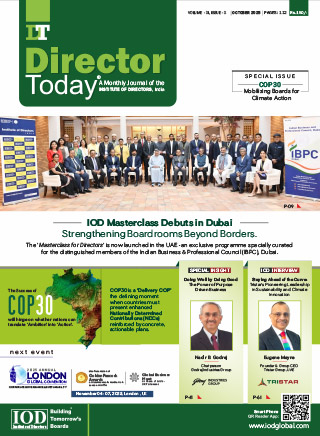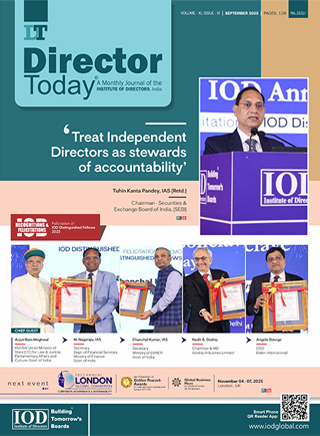IOD Special Talk - Fair Markets in a Changing World

Adapting to Digital Transformation, AI, Diversity, and Sustainability Challenges for Good Governance
It is a privilege to address this distinguished gathering today at the Annual Directors' Conclave of the Institute of Directors (IOD).
As we reflect on the rapid changes happening around us, we find ourselves at a crucial phase in India's growth story. We are on the path to becoming the world's third-largest economy by 2030, just six years from now. The transformation within the country is swift and profound, making it essential for directors and boards to be prepared to navigate both the challenges we currently face and those that may arise.
One of the most significant issues on the horizon is digital transformation. While it brings immense benefits-enhancing consumer welfare and driving innovation-it is also leading to consolidation in the digital marketplace. Companies are growing rapidly and are nearing a tipping point where the first-mover advantage becomes critical. If you look at the Indian start-up ecosystem, we have the third-largest start-up ecosystem, and it has been the endeavour of the government to encourage it through various schemes and policies.
At the end of the day, the growth of the corporate sector is a team effort.
This brings me to the second area of focus, which is 'Artificial Intelligence'. There is a lot of talk going on regarding artificial intelligence. There have been some instances of malpractices. We have seen some instances, like deepfakes being used. That is something which is an area of concern for individuals whose various profiles, voices, etc., might be used. But there could be competition concerns as well, because, when you look at dark patterns, companies using artificial intelligence for algorithmic collusion, or companies using AI for discriminatory pricing, where we are profiling individuals and using price as a parameter to get more returns. While AI has immense potential, particularly in sectors like education and healthcare, these challenges highlight the need for vigilance in corporate governance. Board directors must remain alert to these issues to ensure responsible and ethical use of AI within their organisations.
The third area of focus I would like to touch upon is 'Sustainability.' Green guidelines are being followed, and there is growing awareness among people that the extreme weather events occurring worldwide may be linked to climate change. We must be very conscious of what we are doing on the sustainability front. This responsibility extends beyond our roles on boards and into our actions as individuals in everyday interactions. There is increasing awareness of how our practices and interactions with the ecosystem can impact sustainability. This is a concern that affects us all. And this is not an area where we can simply act locally; we must think globally. We need to consider: What are we doing? What are the effects of our actions? How is it impacting the world around us?
As the Chairperson of the Competition Commission, I must mention that competition is an area that is of great importance. Because, if companies are competing fairly and their practices are transparent and open, it will lead to the growth of all companies. But if companies are indulging in creating barriers to entry, consolidation that is more in the shape of killer acquisitions, then those are the things where we would like, as a regulator in the competition sector, to keep a very close watch on such activities of the companies and various enterprises. So broadly, the themes emerging from this conference are very relevant - it is talking about emerging trends. These are some of the major trends that are shaping corporate governance practices, and boards need to be aware of these developments.
One important area I want to address is the 'Role of Independent Directors.' I think that Greater information sharing is needed due to existing concerns. Finding qualified independent directors is not easy. In fact, I went through a similar experience when I was in ITDC as a CMD, and we had these new Director Liability Guidelines come out. Most of the independent directors wanted to stay away. They were feeling some level of discomfort, thinking, "Well, this is a government organisation, but tomorrow we do not really know everything. We need to carefully consider the director's liability in such cases. This is why we also implemented Director's Liability Insurance."
There needs to be proactive outreach from companies and their management to independent directors to build greater comfort across the entire board. This approach would encourage independent directors to join and contribute more effectively. I believe the Institute of Directors has addressed the issue by publishing a handbook on 'Director Liability Insurance' and exploring ways to enhance the role of independent directors. By doing so, the Institute could attract more professionals to these positions and foster more meaningful participation.
Of course, the issue of 'Diversity' is crucial and must be addressed. Different perspectives are essential, especially in a rapidly changing market and ecosystem. Issues such as digital transformation, the use of AI, and environmental concerns require diverse sets of competencies. We would gain significant value from having directors with varied backgrounds, including different gender groups, ages, and professional qualifications. Their contributions and the value they add to the board are substantial. I think we cannot underestimate the significance of that when it comes to the working of various companies. Of course, they may not be fully equipped, because you might have directors who are competent in particular areas but may not have all the skill sets. All of us are not knowledgeable about everything. So there should be greater emphasis on building competencies. Can we enhance their capacity? Can we build up the knowledge base of the directors so that they can contribute better?
If companies are competing fairly and their practices are transparent and open, it will lead to the growth of all companies.
At the end of the day, the growth of the corporate sector is a team effort. We are already seeing it - in fact, when the whole-time member of SEBI mentioned there is so much interest among people for investing in companies and mutual funds, there is a great deal of investor sentiment backing the corporate sector today. We need to be sensitive to that, and that also means there is a greater responsibility for the directors in terms of how you are going to take the companies forward, keeping investor interests in mind, as well as the interests of consumers and, of course, as participants in the corporate sector, the interests of other corporates and startups that are just getting started and might have very brilliant ideas but may not have the deep pockets or capacity to upscale and deliver results for the larger public.
With these remarks, I have outlined what we are focusing on from a competition perspective. We are committed to supporting you on this journey. Recently, we amended the Competition Act to reflect a greater emphasis on trust. We are not focused on merely catching people or punishing the guilty; rather, our approach is shifting towards collaboration. If we identify any anti-competitive practices, we will provide an opportunity for companies to rectify the situation, make commitments, and take remedial action, allowing the matter to be resolved. Additionally, we will consider settlement options once a contravention has been confirmed following a DG investigation. Our goal is to be part of the growth story and to support the development of the corporate sector and the economy. Thank you.
Author

Ms. Ravneet Kaur, IAS
Chairperson, Competition Commission of India
Owned by: Institute of Directors, India
Disclaimer: The opinions expressed in the articles/ stories are the personal opinions of the author. IOD/ Editor is not responsible for the accuracy, completeness, suitability, or validity of any information in those articles. The information, facts or opinions expressed in the articles/ speeches do not reflect the views of IOD/ Editor and IOD/ Editor does not assume any responsibility or liability for the same.

 Quick Links
Quick Links
 Connect us
Connect us




 Back to Home
Back to Home































